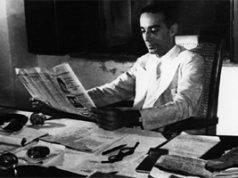It has been hard writing this post and working on my other assignments today. Not because I have suddenly been struck by writer’s block. It’s because of the power cuts that we are experiencing today in office, that have come to be more frequent as the mercury has soared over the last few weeks. This is the story of an affluent neighbourhood in South Delhi. I shudder to imagine what would be the state of affairs in less fortunate parts of the country.
To be fair to the monopolies that produce power, how could they have guessed that demand would go up during summer? It isn’t like summer is hot every year and people come to demand more power through increased use of fans, coolers, air conditioners, refrigerators, etc.
Below is an excerpt from the poem ‘Samar Shesh Hai’ by Ramdhari Singh Dinkar written few years after India’s independence in 1947.
Atka kahan swaraj? Bol dilli! Tu kya kehti hai?
Tu rani ban gayi vedna janata kyon sahti hai?
Sabke bhagya daba rakhe hain kisne apne kar mein?
Utari thi jo vibha, hui bandini, bata kis ghar mein?
Loosely translated, it reads –
Where is ‘swaraj’ being held up? Speak Dilli! What do you have to say?
While you have become the queen, why do the masses continue to suffer?
Who is controlling the fate of everyone in their hands?
In whose house is the ‘prosperity’ that came down being held hostage?
The poem may have been penned some more than 50 years ago, and Dinkar may have something entirely else in mind when penning it. But to me, the poem is as apt today as it could ever have been. Here Ramdhari Singh Dinkar is asking Delhi, the capital city, the seat of power, where the idea of ‘swaraj‘ or self-governance is lost. Even when Delhi has gone on to become the queen, the common man continues to suffer. He asks why the fate of everyone is being controlled by one person and not be people themselves. For Dinkar, the hope and promise of prosperity and a bright future that was carried in the idea of independence has been hijacked.
So what does this poem have to do with frequent power cuts and load shedding in Delhi? Everything. It is the same control of power in one hand, the same monopolistic attitude, the same disbelief in the common man’s judgement and capability in deciding what is good for him and the same unawareness (or intentional overlooking) of the spontaneous order of markets, that led central planning as India’s preferred path to development after independence.
New Delhi is rightly considered as the power centre of the country. However, it is the wrong kind of power – the power to grant special favours, the power of arbitrarily allocating resources to the few that is taken away from the many, the power of doing things it has no business doing.
While we have freed many sectors from the shackles of centralised planning, many continue to remain in the control of only the government and its special invitees. It is the fear of the unknown when letting go of power that is causing this slow rate of growth, slow pace of reforms, and subsequently, these power-cuts.
Post Disclaimer
The opinions expressed in this essay are those of the authors. They do not purport to reflect the opinions or views of CCS.





